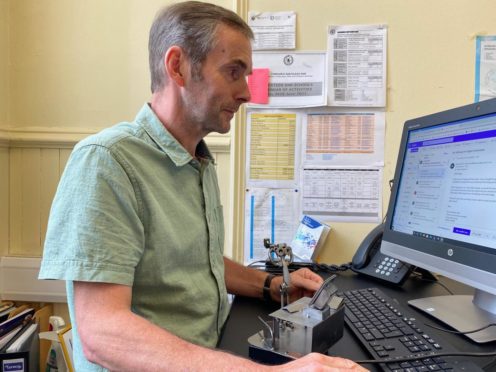Emily Crawford had never met her teacher when she won a UK-wide mandarin speaking competition.
She proved the value of digital learning when she took first place at the British Council Mandarin Speaking Competition in May, outperforming students who had more experience with the language and more traditional instruction.
Emily started her language journey through e-Sgoil, the Stornoway-based digital learning school that connects students to learning opportunities they can’t get where they live.
The school was founded to connect schools spread across the Western Isles. Now it connects students and teachers around the world.
When schools were closed during lockdowns, digital learning dominated conversations about education. At e-Sgoil, leaders, teachers and students hope to prove digital learning can be a positive experience.
Dodging the ‘postcode lottery’ with digital learning
Emily’s story illustrates the breadth of connections that e-Sgoil makes possible. From her home school at Grove Academy in Dundee, she was able to take Mandarin by way of e-Sgoil’s partnership with SCILT, Scotland’s National Centre for Languages.
Emily had never met her instructor Xiaoyan Zhou in person when she entered the competition. Still, she won first place in Scotland and in the UK in the beginner category.
SCILT is run through the University of Strathclyde. Director Fhiona Mackay said that an early partnership with e-Sgoil created opportunities for students like Emily. And moving learning online opened up opportunities that were otherwise off the table.
“It can become a bit of a postcode lottery. For example, with Mandarin – if you happen to go to a school that has a Mandarin teacher, then you’ll have the opportunity to learn it. But the vast majority of Scotland’s students don’t go to a school where Mandarin is on the curriculum.”
Teacher Laura Howitt-Zaman knows first-hand how digital learning can keep kids from gambling on course offerings.
In 2018, she was set embark on a year in Spain for professional development. But her school in the Argyll and Bute Council area couldn’t replace her. That meant her Gaelic and Spanish pupils might have to pause in their courses while she was away.
Instead, she signed on with e-Sgoil. She taught her own students while overseas and returned to them next year. The process prepared them for lockdown.
“When we came to doing online learning last year, I noticed a lot of my pupils were unfazed by it. They had done it for a year in a low-stakes environment. So they were kind of ahead of the game.”
How technology’s ‘chief skeptic’ came to embrace digital learning at e-Sgoil
The original concept for e-Sgoil didn’t include Dundee students learning Mandarin from Glaswegian teachers via a network rooted in Stornoway. The school’s first goal was to facilitate language education across the Western Isles.
Five years ago, when Angus Maclennan was asked to be head teacher at e-Sgoil, he suspected a mistake. The self-described ‘chief sceptic’ had little experience or interest in technology.
If e-Sgoil is a dartboard, the bullseye is equity of learning.”
Angus Maclennan, e-Sgoil head teacher
But former Western Isles education boss Bernard Chisholm finally wore him down. Now, after five years as head teacher, Mr Maclennan sees the error of his ways.
“(Mr Chisholm’s) take on it was that this is not about technology. I think that view has been proven right all along. Yes, of course you have to have the network. But you can be agnostic as far as the technology is concerned.
“It’s about good quality learning and teaching. If e-Sgoil is a dartboard, the bullseye is equity of learning.”
Thanks to further investment from the Scottish government and support from the Northern Alliance, e-Sgoil quickly expanded its reach and course offerings. Installing Digital Depute Teachers across the country also boosted economic and educational opportunities, Mr Maclennan said.
“The willingness of the Northern Alliance to support e-Sgoil financially by paying the Digital Deputes’ salaries was critical to ensuring that we were able to spin up provision during lockdown.
“The level of collaboration and cooperation across the NA local authorities has been hugely important.”
Capitalising on crises, turning challenges into opportunities
Mr Maclennan understands that digital learning isn’t the right choice for every student. Just as some children thrive in an online setting, others struggle to feel connected.
The pandemic made digital learning a temporary necessity across the country. For children living in remote areas, or who wish to focus on less popular subjects, the need started earlier and will continue in the future. Rather than bemoaning this reality, Mr Maclennan is hopeful about its potential.
“We’ve been trying to instil independence, resilience, all of these things into our pupils for the whole of their school career. This is not going to derail them. It’s going to give them an opportunity to prove themselves despite adversity.
“You have to capitalise on every crisis. With every challenge comes an opportunity.”
Want to read more?
Check the Press and Journal for more about education in the Western Isles and how schools from Stornoway to Aberdeen are using technology to help students prepare for transitions.

